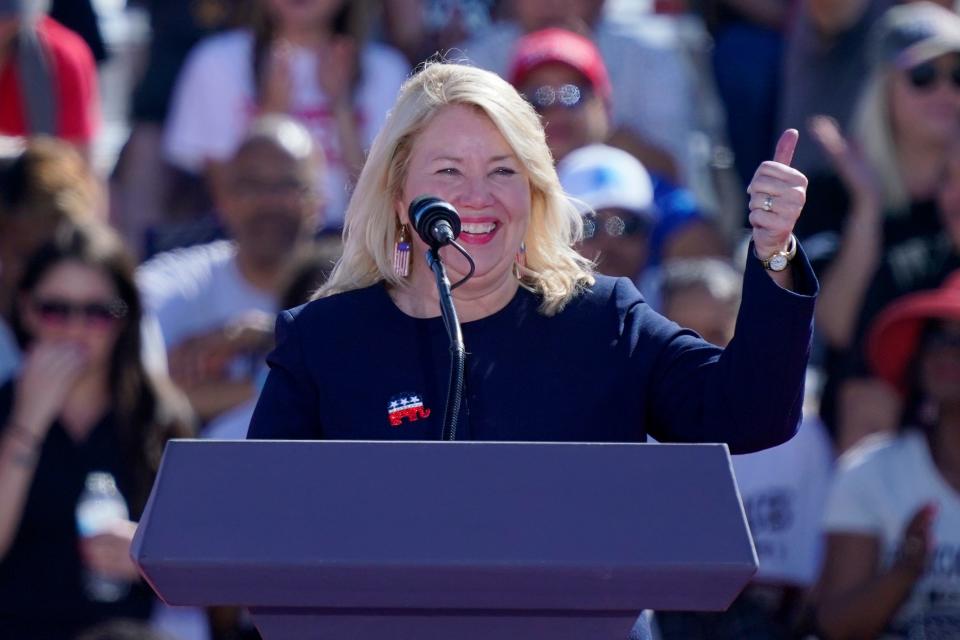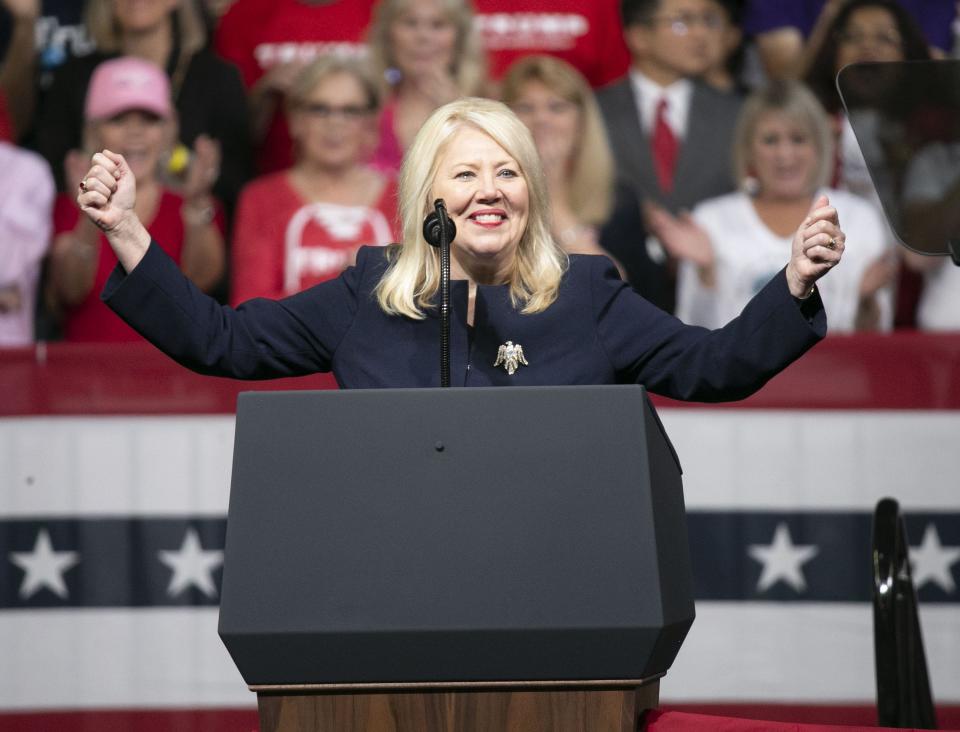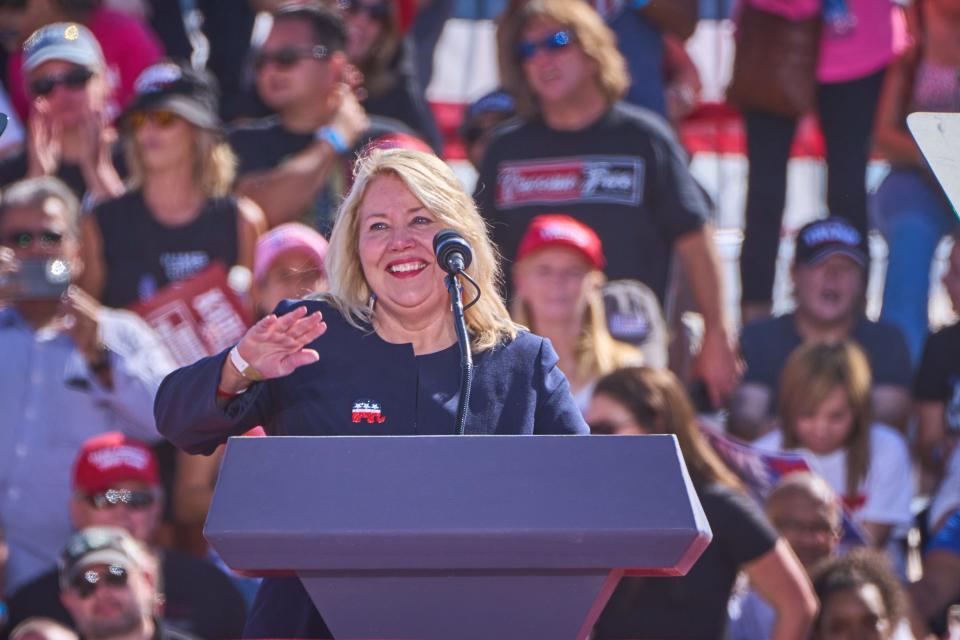Rep. Debbie Lesko exiting Congress with little to show for her 5 years in the House
When Rep. Debbie Lesko began her first full term in Congress in 2019, she was one of four Republicans on the House Rules Committee, an assignment with quiet power for the majority party and an especially frustrating one for the GOP, which was not.
For Lesko, R-Ariz., it was a sign of mutual faith between her and then-House Minority Leader Kevin McCarthy, R-Calif. She had a relatively full plate of committee assignments for a newcomer, and she put in two years on Rules in a move that could pay off for her down the road.
By 2021, she rose to the far more influential House Energy and Commerce Committee and was seen as one of the more conventional members of the often-unruly House Freedom Caucus.
Fast forward to Oct. 3: McCarthy was deposed as House speaker — with notable help from two of Lesko’s fellow Arizona Republicans. The resulting leadership void that remains unresolved left her dismayed.
“This is a total disaster,” Lesko told reporters in Washington.
Lesko’s surprise retirement last week ensures her congressional career will likely end next year with an impressive climb within the institution of Congress, but relatively little to show legislatively. A spokesperson said Lesko was not available last week to elaborate on her decision and her career.
“Clearly, being in the minority for most of her service and being junior limits how much you’re going to get done,” said Bruce Oppenheimer, a political science professor emeritus at Vanderbilt University who focused on legislative politics.
He said Lesko’s seat on the Commerce Committee is a sign of how leadership viewed her. Her retirement from a safe seat for an incumbent Republican seems to be a sign of how she views Washington.
“Disaffection with the institution happens,” Oppenheimer said.
Ambassador for Republican women
Lesko spent two full terms operating under Democratic control, when few GOP priorities could advance. Under Republican control this year, the chamber is engulfed in an intraparty power struggle that leaves in doubt whether the government can even pass an annual budget.
But Lesko showed her personal popularity within GOP circles in other ways.
Lesko has been an ambassador for Republican women, and in the 2022 elections, voters elected more of them than ever. She achieved a moment of prominence when former President Donald Trump picked her to help his messaging operation during his first impeachment trial.

Wendy Schiller, a political science professor at Brown University, where she studies Congress, gender and politics, said Lesko’s retirement is a blow for Republican efforts at recruiting women.
“She got her name out there pretty quickly when she came to the House,” Schiller said.
“My guess is when the National Republican Congressional Committee went out to recruit women to run for Congress, she was front and center in the recruitment efforts. Seeing someone like her be successful and navigate the party is something the party could use or could have used as inspiration for deciding to run because part of the problem for Republicans more than the Democrats is there aren’t enough women willing to run for the House.”
Lesko “carved out a pretty good territory for herself” as a voice for the GOP on border security, gun rights and women’s security, Schiller said.
In most respects, Lesko was a low-drama replacement to former Rep. Trent Franks, R-Ariz., whose eight-term career ended in 2017 after a former staffer said he offered her millions to be the surrogate mother of his child.
“The fact that she was able to serve on Energy and Commerce, which is generally considered an ‘A’ committee, coming from a safe seat, does say a lot about her,” said Chris Baker, a Republican campaign consultant who has not worked for Lesko.
“They tend to give those seats to Republicans in vulnerable seats. That speaks well of her, that she was able to move into a position of influence quickly. … No one can deny that fact.”
Prime sponsor of 2 bills that became law
The Center for Effective Lawmaking, a project involving Vanderbilt and the University of Virginia, attempts to measure legislative effectiveness for members of Congress by the kind of bills they pursue and how far those proceed. It accounts for being in the majority or minority.
By their methods, Lesko was one of the top members of Congress in her first full term, when Democrats controlled the House and Trump was president. In her second full term, Lesko was below average when Democrats controlled the House and President Joe Biden was in the White House.
Overall, she was the prime sponsor of two bills that became law, according to GovTrack, a nonpartisan organization that monitors Congress and its legislation.
One bill renamed a post office in Surprise. The other required an analysis of the safety of the nation’s ports of entry.
Earlier this year, Lesko was the prime sponsor of a bill to “Save Our Gas Stoves,” a partisan measure seeking to bar federal prohibitions on gas-powered stoves. It passed the House in June mostly with Republican votes and has, so far at least, languished in the Democratic-controlled Senate.
“I never would have thought that I would need to introduce legislation to protect American’s kitchen appliances,” she said during floor debate. “But this only goes to show how out of touch this administration’s policies have become.”
Rep. Betty McCollum, D-Minn., argued against the bill, and a companion measure.
“These bills are the latest Republican attempt to manufacture a crisis and reject common-sense rulemaking from the Biden administration,” she said. “These bills are purposefully misleading and reject legitimate concerns about the threats gas stoves pose to our personal safety, public safety, and the energy efficiency of our homes.”
The White House issued a statement of its strong opposition, noting that it wasn’t trying to ban gas stoves, and such decisions will ultimately be rooted in safety and science.

Only two other Lesko bills have made it to the Senate, according to ProPublica’s analyses of bills during her career.
There are other, less glamorous duties in Congress, such as tending to constituent concerns. Lesko’s tenure included triaging the problem of managing the pandemic. Her office fielded calls from business owners trying to secure emergency federal funding, along with the usual slate of problems, from Medicare and Social Security to passports and unemployment assistance.
She voted to set aside Arizona election results
After the 2020 presidential election, Lesko had a mixed record in Republican efforts to overturn Trump’s loss in Arizona and in the Electoral College.
Before Maricopa County certified its results, Lesko didn’t join her other House Republicans from Arizona in sending a letter to the Board of Supervisors asking the county to manually audit every ballot cast.
But Lesko was one of more than 100 congressional Republicans to join a failed December 2020 lawsuit trying to set aside results in other states.
The day before the Jan. 6, 2021, riot at the U.S. Capitol, Lesko told her House Republican colleagues in a meeting that she was worried Trump supporters actually thought Congress could reverse Trump’s loss.
“And when that doesn’t happen — most likely will not happen — they are going to go nuts,” she said in a recording played for the select House committee that probed the causes of the riot.
On the day of the riot, Lesko, and 138 other House Republicans, voted to set aside the results in Arizona and Pennsylvania after the pro-Trump mob stormed the Capitol.
Her own campaigns were less suspenseful.
After an unusually competitive special election in April 2018, Lesko’s electoral hold on her district grew to the point that Democrats didn’t formally challenge her in 2022.
She has voted the same as McCarthy 92% of the time this year, and about that much in earlier terms, ProPublica found.

Lesko had a burst of attention in January 2020, when Trump made her one of eight House Republicans on his first impeachment defense team.
She helped offer the White House’s view of the case House Democrats brought against him for pressuring Ukrainian President Volodymyr Zelensky into saying that country had opened an investigation into Hunter Biden and threatening to withhold military aid Congress had already approved.
“Democrats are playing politics, and they are playing dirty,” she said at the time. “I will continue to fight against this corrupt and unfair process and look forward to assisting President Trump as a member of his Impeachment Team.”
Lesko also has been co-chair of the bipartisan Women’s Caucus in Congress, and a leader for Republican efforts to recruit more women into their ranks.
In a 2019 interview with PBS’ “Newshour,” Lesko discussed the discouraging numbers in Congress at the time: Of the 36 women newly elected to Congress in 2018, Lesko was the only Republican.
Overall, there were 13 Republican women in the House that year.
“It’s sad. We need to increase the numbers,” Lesko said. “Yes, it’s a little one-sided, because I try to get all my Republican women to our different events, but there’s a lot more Democrats.
“I don’t know the answer. I think one of the answers is recruiting Republican women for heavily Republican districts, because we have a lot of women that lost that were in swing districts. And the Democrats, quite frankly, tried to take us out, so that they could continue the narrative that there’s more males in the Republican Party than women.”
Until the 1990s, both major parties were equally poor at electing women to Congress, with about 5% of members being women. Democrats have done better since, with about 40% of Democratic seats now held by women. Republicans grew far slower.
The current Congress began with 33 House Republican women, a record.
While some things have changed during Lesko’s tenure, some things have not.
One seeming constant in her political career, which began in the state Legislature, has been the presence of Rep. Andy Biggs, R-Ariz., who was in the state Legislature for years with Lesko and has often waged high-profile political standoffs that affected all around him.
In 2016, for example, Biggs, who was then president of the Arizona Senate and a first-time congressional candidate, would not allow a vote to include KidsCare, a health insurance program for 30,000 children of poor families in Arizona, in the state’s budget. Arizona was the only state in the country without such a program at the time.
The Legislature eventually passed the measure, but only after it dragged on for months and put others on the hot seat over whether to take the federal money that went with the program. Lesko told the Associated Press at the time she wasn’t sure how she would vote on that matter.
“I’m conflicted on the issue and will have to see if President Biggs puts it up on the board,” Lesko said. “Then I’ll have to make a decision.”
She wound up voting against the bill.
In June, Biggs and Rep. Eli Crane, R-Ariz., delayed the vote on her gas stove bill in a procedural battle with McCarthy that presaged the vote to oust him four months later.
And earlier this month, Biggs and Crane were part of the eight House Republicans who joined every House Democrat to vote to remove McCarthy as speaker, casting the chamber into turmoil.
Schiller said the battle over the speaker's gavel is another low point in an era when party control has reduced most House members to foot soldiers in battles chosen only by leadership.
“As polarization has really cemented not only division between Republicans and the Democrats, it’s also cemented party power over individual members,” Schiller said. “As the parties consolidate all of the power over legislation and then they decide they don’t even want to do legislation, there’s no point in being senior on any of these committees. You can’t get anything done.”
Whatever happens next for the House, it’s unlikely that Lesko’s West Valley-based district will change much.
Republicans enjoyed a 15-percentage point registration advantage over Democrats there as of July. By comparison, across the rest of Arizona, Republicans have about a 3-percentage point lead over Democrats.
This article originally appeared on Arizona Republic: Arizona's Rep. Debbie Lesko exits Congress with little to show

